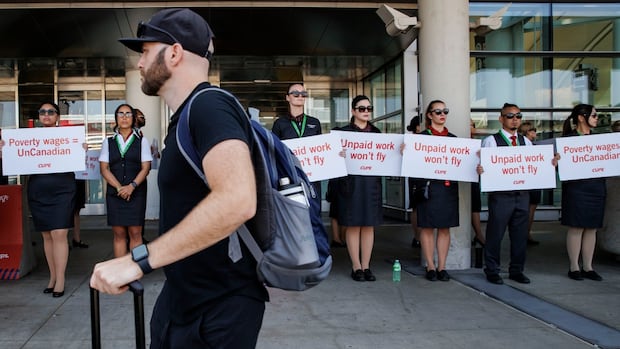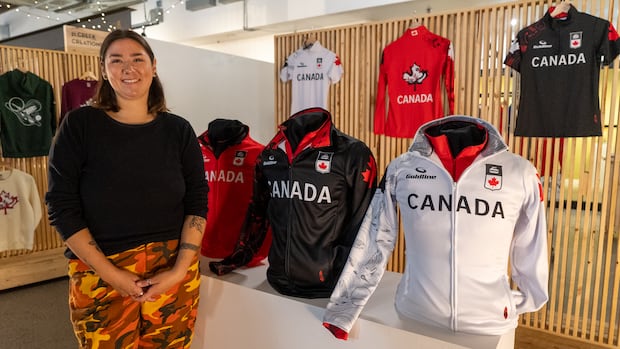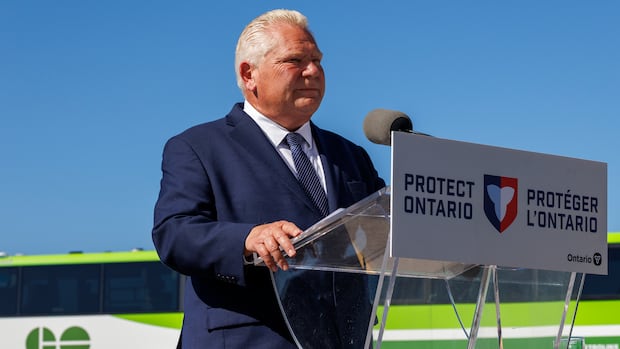The union representing Air Canada’s flight attendants says it has declined the airline’s proposal to resolve negotiations using an arbitrator, according to an update on the bargaining committee’s website.
The Canadian Union of Public Employees (CUPE) wrote on Tuesday that Air Canada had proposed referring the matter to binding interest arbitration, a process that would bring a third party into the talks.
On Tuesday afternoon, Air Canada said talks had reached an impasse, and that the two sides were far apart.
The arbitrator would hear proposals from each side about specific agenda items that haven’t been agreed upon and then make a decision that would bind both parties.
It would also suspend the chance of a lockout or strike. CUPE members voted overwhelmingly in favour of a strike mandate last week, paving the way for workers to walk off the job as soon as 12:01 a.m. ET on Aug. 16.
CUPE published a letter addressed to the president of its Air Canada component, Wesley Lesosky, and signed by Air Canada vice-president and human resources chief Arielle Meloul-Wechsler on Monday.
“After eight months of negotiation, we have been unable to reach a tentative collective agreement despite our best efforts,” the letter says.
Outlining the proposal, it adds that “if we cannot agree on an arbitrator within 30 days of your agreeing to the proposal, we ask the Minister of Labour to name one.”
CUPE declined the proposal and intends to stay at the bargaining table, Lesosky wrote in a response addressed to Meloul-Wechsler on Tuesday.
A representative for CUPE told CBC News that both sides are “back to evaluating proposals” after their exchange. CBC News has also reached out to Air Canada for comment.
Air Canada flight attendants picketed outside of four major airports across the country, including Montreal’s Trudeau airport on Aug. 11. They voted overwhelmingly to approve a strike and could walk off the job as early as Aug. 16.
Binding interest arbitration tends to be preferred by employers “because you are avoiding the strike and the business disruption,” said Malini Vijaykumar, an employment and labour lawyer at Nelligan Law in Ottawa.
The federal government would first have to pass legislation forcing the parties to go to arbitration.
But that’s a “really risky thing to do,” Vijaykumar said, because the union could challenge it under a section of Canada’s Charter of Rights that protects the right to strike through freedom of association.
“So even that’s not a silver bullet, so to speak, to prevent a strike,” she said, referring to the arbitration process.
Talks ongoing since March
CUPE’s Air Canada component represents more than 10,000 flight attendants who work for the major airline and its budget carrier Air Canada Rouge.
Some of those workers held demonstrations on Monday outside major Canadian airports in Toronto, Montreal, Vancouver and Calgary for what the union called a “day of action.”
The union says the most contentious issues at the bargaining table are wages — which it says have not kept pace with inflation — and unpaid work that occurs before boarding and after deplaning, such as safety checks and assisting passengers.
Henly Larden, an Air Canada flight attendant and the vice-president of CUPE 4094, says flight attendants work an average of 35 unpaid hours per month related to duties performed during boarding and deplaning. This comes as Air Canada flight attendants rallied outside major airports on Monday as part of a national day of action to protest low pay and unpaid work.
Air Canada’s latest offer includes paying flight attendants 50 per cent of their wage for work done on the ground, but the union is still pursuing a 100 per cent ground pay rate, according to CUPE’s Tuesday update.
CUPE said last week that it would continue talks with Air Canada until Aug. 15, the day before a potential strike on Saturday.
The two parties have been negotiating since March, when the previous 10-year collective agreement expired. But the talks reached an impasse in May, at which point the union filed for conciliation with the federal labour minister.
At the time, Air Canada said that its pay structure is in step with other global carriers.
Delta Air Lines is the only major North American airline that offers ground pay to its flight attendants, paying them at half their hourly rate for 40 to 50 minutes of boarding time depending on the flight destination and aircraft.
Porter Airlines, a smaller Canadian carrier that operates out of Toronto and several smaller cities, has started paying for at least part of the boarding time that its flight attendants work.








